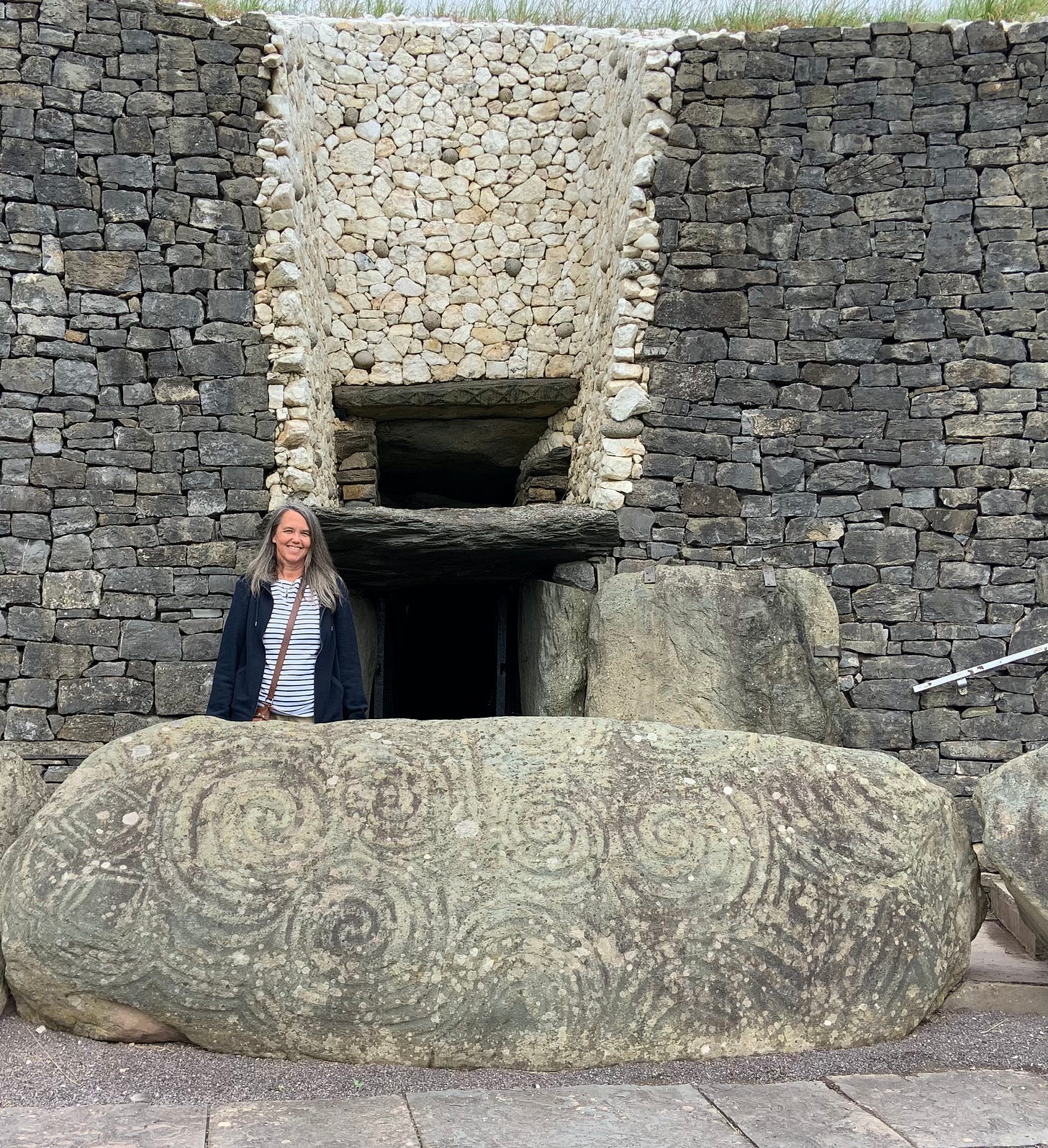
As a child, I was fascinated by the idea of lost civilisations. Of buildings woven into overgrown jungles or buried under tombs of dirt.
As well as checking the back of every wardrobe for the entrance to Narnia, I’d dig the garden for ruins. When I moved from the countryside to London, aged nineteen, I would ride the top deck of the iconic red buses and marvel at the neglected edifices rising above the razzmatazz retail shopfronts—flaking painted advertisements on brick facades or old-fashioned rainbow-stencilled typefaces, Dick Tracy style, on grimy sash windows.
I loved that London wasn’t just one city, it was many of them one on top of the other, a palimpsest of Londons, layered like shale and with ancient river gods snaking silently beneath the rain-dark streets.
I exchanged the city for rural Ireland in my early-fifties and now, when I visit London, the changes jarr me like a personal affront. Shimmering just out of sight in an off-kilter dimension is the street or skyline as it used to be and with it, the person I was then too. I am ageing into a collage of all the places and people I’ve loved, many of them no longer on this earth, so many of them invisible to the naked eye.
That’s why old friends are so important, even if they’re out of sync with the version of ourselves we’re currently wearing. They remember the context of our lives and the people we’ve been; they are the bedrock of our personal archaeology.
Although my conservative psychogeographer bristles at London’s continuing evolution, there’s a part of me that knows that everything changes, everything passes. In a moment of wisdom gifted to me by my mother during my mid-life hellscape of losing my health, fertility, finances, career, marriage, home and social status, she said, ‘This too shall pass.’ Because everything does. Unfortunately, that also means the stuff we’d like to hold onto.
As a child, it felt so exciting to imagine the future; for young people today, and for me now looking into the darkened glass of ageing, those fantasies feel ludicrously shaky and privileged.
It’s not just my old age that is unimaginable, it’s the fact that everything I imagined was immutable, isn’t. Not just the cities, but the landscapes, the trees, the birds, the insects, the seas, the libraries, the poems, the certainties. And of course, the very me-ness of me too will pass. One day I’ll be gone, which sounds fine in the abstract, having had a near-death experience as a child, I’m fairly sanguine about death, but it’s a tautology to truly imagine it—because who is this me imagining it? Aged about seven, I would lie awake at night trying to imagine eternity—I had a plan that if I could hold the idea of it in my mind for as long as possible, I might get a taste of it. But then I would fall asleep.
We all fall asleep.
Our civilisation is sinking below the weight of itself and one day, in perhaps ten or twenty thousand years, a skinny girl with beetle-dark hair might be digging in the sweet, fertile humus of new soil and find something mysterious: the skeleton of a single metal roller skate; the mysterious empty latticework of a laptop frame; the shiny silver disc of a CD; a rainbow sludge of plastic that was once a pot of anti-ageing cream…
I’m a positive pessimist, to use Prof. Jem Bendell’s term, and something tells me I’ve been preparing for this ending my whole life; maybe longer. After all, I have already survived the ending of what I thought my life was meant to be more than once through childhood trauma, divorce and childlessness, and I’ve had my home and all my possessions ripped from underneath me four times now.
Life has been generous with her teachings around impermanence.
When I can’t sleep, I listen to stories. Currently, I’m working my way through Paul M. M. Cooper’s The Fall of Civilisations podcast, and I find it deeply soothing to know that one day, we too will be part of this old, old, story. As a young child, whilst everyone else was watching TV on a Saturday night, I’d sit alone in the dining room and read my grandfather’s multi-volume Reader’s Digest edition of Gibbon’s The History of the Decline and Fall of the Roman Empire; I can’t pretend I understood it, but I knew there was something in there I wanted to understand, and I was hungry for it.
I was born into a time of endings, and strangely enough, for all my awful experiences with them, I know they bring out the best in me. They tap into the gifts of my ancestors that sing through my blood; gifts of deep knowing, connectedness, and a steadfastness in life’s storms that others can rely upon.
I have been here before; we all have.
In the long, dark teatime of the soul (to quote the brilliant Douglas Adams) we face, I plan to cherish this beautiful world and all the crazy-amazing souls, creatures and beauty in it, both human and more than human, animate and inanimate. To wail and mourn as things pass, and yet to wake up each new day that I’m granted with gratitude, grace, grief and grit. To write my heart out whilst also helping to build practical ways to support myself and others to live and love each other through whatever comes. And in doing so, I hope to help us all uncover the brilliance of our humanity hidden under the numbing, stagnant layers of modern life.
This too shall pass. All of it. But as we’re already in Narnia; let’s remember to love the magic too.
Thank you for being one of my treasured readers and for making me a Substack Bestseller! If you’d like to support my work and and take part in the projects/offerings I’m planning just for paid subscribers in future, please do consider taking out a paid subscription. (And should you ever need the access that a paid subscription offers, but can’t pay for one, message me and I’d be happy to comp you one - what we’re doing here is way more important than capitalism!)
And if none of the above are possible, I still deeply appreciate you for your ‘hearts’, your insightful comments, your generous sharing and your continued presence in my life and thoughts. Being an ‘outsider’ doesn’t feel so lonely with your company. Hugs, Jody x






I just love your line: "I am ageing into a collage of all the places and people I have loved, many of them no longer on this earth, all of them invisible to the naked eye." ❤️
What a beautiful, luscious image you paint of that little girl in the far off future. When I break things like plates and cups, I thrown them in the garden and think "archaeology".